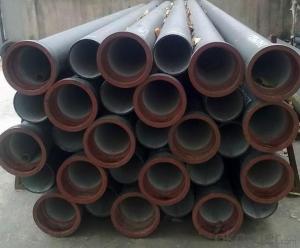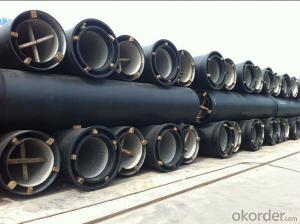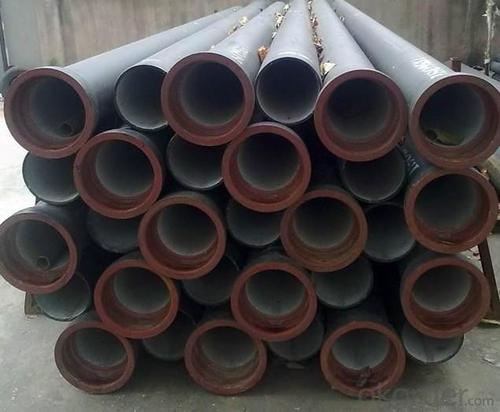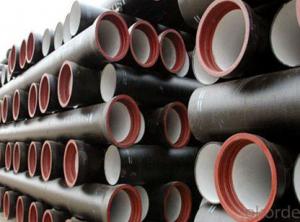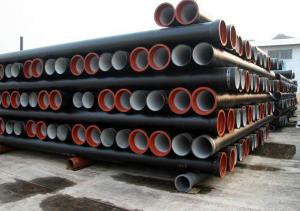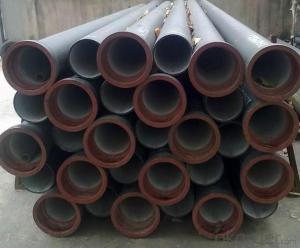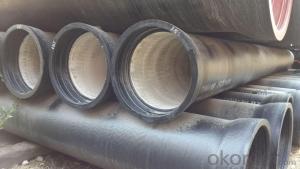Ductile Iron Pipe of China DN200-DN800 EN598
- Loading Port:
- China main port
- Payment Terms:
- TT or LC
- Min Order Qty:
- 25 m.t.
- Supply Capability:
- 300000 m.t./month
OKorder Service Pledge
OKorder Financial Service
You Might Also Like
1,Ductile Iron Pipe Description :
1) Pipes confirm to ISO2531,K9 class,T type joint,6m long,with inside cements lining conform to ISO4179, outside Zinc spraying(130g/m2) and bitumen coating(70μm) conform to ISO8179.
2) Pipe ends: Spigot and socket ends, with 100% SBR rubber gaskets accoding to ISO4633
3) we can do third party inspection according to customer's request.
2,Main Features of the Ductile Iron Pipe:
·High yield strength
·High tensile Strength
·High corrosion resistance
·Pressure Resistence
·Satisfy the highest hygienic standards
3,Ductile Iron Pipe Images:
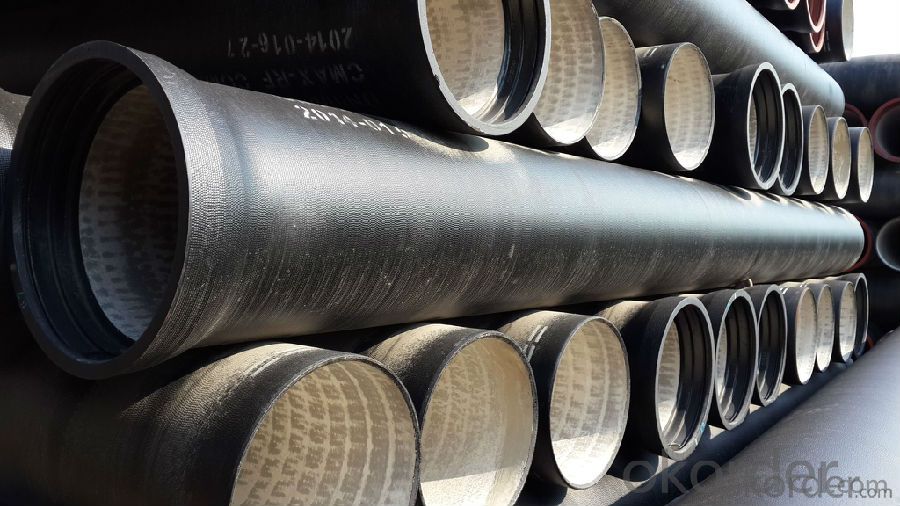
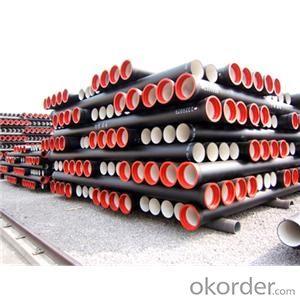
4. Ductile Iron Pipe Specification
Standard: API SPEC 5L 44th eidtion,ASTM A252-98(2007)
Grade: A53 Grades A/B, ASTM A106 Grades B/C,ASTM A179
AWWA, C200, ASTM A139, ASTM A120, API 5L Grade B
Weld Alternatives: LSAW
OD size range: 6.4~44.5mm
Wall thickness: 406.4~1422mm
Length: 3 - 12 m according to requirment
5.FAQ:
We have organized several common questions for our clients,may help you sincerely:
1.Q: Why would you choose ductile iron pipe rather than other pipe materials?
A:The reasons are obvious for that not only ductile iron pipe possesses the inherent strength and flexibility of ductile iron, combined with proven corrosion protection systems, but also the cost savings can be achieved from design to installation and commissioning.
2.Q:Why can you guarantee the inner of pipes can’t be corroded?
A: High alumina cement mortar lining and sulphate-resistant cement mortar lining. These two special linings are applicable to inner anti-corrosion for sewage pipes, improving resistance to erosion of the sewage components.
- Q: What are ductile iron pipes?
- Ductile iron pipes are a type of iron piping that possess unique properties, making them highly durable and flexible. They are made by adding small amounts of magnesium to cast iron, which transforms the brittle material into a stronger and more malleable form. Due to their high tensile strength and ability to withstand extreme conditions, ductile iron pipes are commonly used in various applications such as water and sewage systems, industrial plants, and transportation infrastructure.
- Q: Is it better to use steel tubes or ductile iron pipes for water supply?
- Flexible seamless steel pipe is good toughness, good processing, better than ductile iron corrosion resistance, the price is slightly higher;
- Q: What is the difference between spheroidal graphite cast iron QT400-15 and QT400-15A? What does the A mean later?
- This should be said in front of the material, and later add A, should refer to the grade
- Q: Can ductile iron pipes be used for pressure reducing stations?
- Ductile iron pipes are indeed capable of being utilized in pressure reducing stations. Renowned for their robustness and resilience, these pipes are well-suited for managing applications involving high pressure. Their exceptional resistance to corrosion allows them to endure the mechanical pressures and strains typically associated with pressure reducing stations. Moreover, the smooth interior surface of ductile iron pipes minimizes friction losses and contributes to maintaining a consistent and regulated pressure within the system. Consequently, it can be concluded that ductile iron pipes are a dependable and frequently employed material in pressure reducing stations.
- Q: What is the expected deflection range for ductile iron pipes?
- Several factors, such as pipe diameter, wall thickness, soil conditions, and installation methods, can affect the expected deflection range for ductile iron pipes. Compared to materials like PVC or concrete pipes, ductile iron pipes generally have a higher deflection capacity. For ductile iron pipes with smaller diameters (up to 12 inches), the typical expected deflection range is around 2-3% of the pipe diameter. In other words, a 12-inch ductile iron pipe could potentially deflect by approximately 0.24-0.36 inches. On the other hand, larger diameter ductile iron pipes (greater than 12 inches) can have a slightly higher expected deflection range, ranging from 2-5% of the pipe diameter. For instance, a 24-inch ductile iron pipe could potentially deflect by approximately 0.48-1.2 inches. It is important to remember that these values are general estimates and should be confirmed with the manufacturer's specifications or engineering design guidelines specific to a particular project. Furthermore, following proper installation techniques and backfilling practices is crucial to ensure the structural integrity of the pipe and prevent excessive deflection.
- Q: What is the expected pressure rating for ductile iron pipes?
- The pressure rating for ductile iron pipes can differ based on factors like pipe diameter, wall thickness, and specific application. In general, ductile iron pipes are built to endure high-pressure situations. They are frequently utilized in water and wastewater systems, where they can normally manage pressures ranging from 150 psi to 350 psi or more. To ensure safe and dependable operation, it is crucial to refer to the manufacturer's specifications or relevant industry standards for precise pressure ratings based on pipe size and application.
- Q: Can ductile iron pipe be used for industrial applications?
- Yes, ductile iron pipe can be used for industrial applications. Ductile iron pipes are known for their durability, strength, and resistance to corrosion, making them suitable for various industrial settings. They can handle high-pressure and heavy-duty applications, making them ideal for industries such as water and wastewater, oil and gas, and chemical processing.
- Q: How can the cast iron pipe of the ductile iron pipe be repaired?
- Get a pole. Or go around the corridor
- Q: Are ductile iron pipes suitable for installation in areas with high groundwater contamination and soil erosion?
- Areas with high groundwater contamination and soil erosion are typically well-suited for the installation of ductile iron pipes. This is due to the fact that ductile iron pipes are renowned for their durability, strength, and corrosion resistance. They exhibit exceptional resistance to acidic and alkaline soils, rendering them appropriate for regions with elevated levels of groundwater contamination. Moreover, the robust construction of ductile iron pipes grants them a formidable resistance to soil erosion. They are engineered to endure a range of external forces, including the pressure exerted by the surrounding soil and the potential movement resulting from erosion. Consequently, they are a dependable choice for installation in areas prone to soil erosion. Nonetheless, it is vital to acknowledge that while ductile iron pipes can withstand high levels of groundwater contamination and soil erosion, the implementation of proper installation techniques and maintenance practices is crucial to ensure their longevity and optimal performance. Regular inspections, meticulous backfilling, and the application of suitable protective coatings should be employed to maximize the lifespan of the pipes. To sum up, ductile iron pipes are generally well-suited for installation in areas characterized by high groundwater contamination and soil erosion. Their durability, strength, resistance to corrosion, and high resistance to soil erosion establish them as a reliable choice for such environments. However, adhering to proper installation and maintenance practices is imperative to guarantee their longevity and optimal performance.
- Q: What is the expected hydraulic performance of ductile iron pipes?
- Ductile iron pipes are known for their exceptional hydraulic performance, boasting a remarkably smooth inner surface that facilitates fluid flow, resulting in reduced friction losses and increased flow rates. With excellent resistance to corrosion and abrasion, these pipes demonstrate long-lasting efficacy in diverse water and wastewater applications. In addition, the high tensile strength of ductile iron pipes enables them to withstand substantial internal and external loads without any deformation or failure. Their versatility allows for usage in both above-ground and below-ground scenarios, encompassing water distribution systems, sewage and wastewater transport, industrial piping, and irrigation systems. Moreover, the flexibility and resilience of ductile iron pipes enable them to adapt to ground movement and settle without any risk of breakage. This attribute proves invaluable in areas with unstable soil conditions or seismic activity, making these pipes a dependable choice. Overall, the hydraulic performance of ductile iron pipes is characterized by efficient flow, minimal pressure losses, durability, and the capacity to withstand various external forces. These exceptional qualities establish them as a favored option for water infrastructure projects, ensuring reliable and efficient fluid transportation over a prolonged service life.
Send your message to us
Ductile Iron Pipe of China DN200-DN800 EN598
- Loading Port:
- China main port
- Payment Terms:
- TT or LC
- Min Order Qty:
- 25 m.t.
- Supply Capability:
- 300000 m.t./month
OKorder Service Pledge
OKorder Financial Service
Similar products
Hot products
Hot Searches
Related keywords
